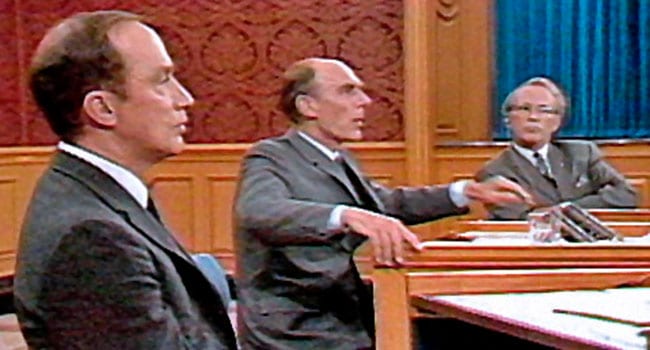 With the current controversy over the leaders’ debates for the upcoming federal election, it’s interesting to take a trip down memory lane and revisit our first televised confrontation. It all happened on June 9, 1968, before a vast audience – estimated at 14 million out of a population just shy of 21 million. But despite the expectations and the hype, the event itself was a dud.
With the current controversy over the leaders’ debates for the upcoming federal election, it’s interesting to take a trip down memory lane and revisit our first televised confrontation. It all happened on June 9, 1968, before a vast audience – estimated at 14 million out of a population just shy of 21 million. But despite the expectations and the hype, the event itself was a dud.
To trace the provenance of it all, you need look no further than the famous Kennedy-Nixon debates in the 1960 American presidential election. Riveted by the related drama, politically interested Canadians very much wanted their own show, and 1968 was considered the perfect occasion. After all, in the person of Pierre Trudeau, we now had our own unique version of the charismatic JFK.
Although there were four American debates in 1960, it was the first one that had the biggest impact. Held just over six weeks before the election, it pitted a cool, confident, tanned Kennedy against a sweaty, haggard, sick-looking Nixon. Chicago mayor Dick Daley was succinct in his description of Nixon’s appearance – “They’ve embalmed him before he even died.” And to underline Daley’s point, the Gallup poll registered a five point pro-Kennedy swing.
In the lead-up to June 9, 1968, the general anticipation was for a Trudeau triumph. Trendy communications guru Marshall McLuhan even pronounced him perfect for the part. Writing in his typically opaque style, McLuhan declared that “The story of Pierre Trudeau is the story of the Man in the Mask. That is why he came into his own with TV.”
Other less grand media figures contented themselves with meditations on Trudeau’s charisma and general “coolness,” his cerebral aura, his quick wit, his TV-friendly bone structure and his distinctive Caesar-like hairstyle. Compared to the staid Tory Robert Stanfield and the NDP’s old-fashioned Tommy Douglas, it would be no contest. Hip modernity would simply blow away 1950s dowdiness.
But the night itself turned out somewhat differently. When the three leaders sat down for the two-hour debate, Trudeau was surprisingly flat and uninspired. If there was a winner, the consensus opinion gave the nod to the feisty Douglas.
In the ensuing post-mortems, there was considerable puzzlement as to where Trudeau had misplaced his celebrated style and vigour. Perhaps he’d been over-coached, although such a conclusion seemed at odds with his reputation for being his own man. In any event, it had all been tediously anti-climactic, and not a patch on the Kennedy-Nixon drama of eight years earlier.
Trudeau himself agreed, declaring the whole thing to have been “pretty dull,” indicating that he “wouldn’t want to impose another one on the Canadian public.” And true to his word, although he ran in four subsequent elections, only one of them – 1979 – featured a debate.
Mind you, the 1968 political debate performances didn’t make any difference in the end. On election night, Trudeau won a strong majority while increasing the Liberal vote share by more than five percentage points. And Douglas, the erstwhile debate winner, suffered the indignity of losing his own British Columbia seat. Winning the battle and winning the war were indeed two very distinct things.
Perhaps, though, you’re inclined to think that it was at least simpler and less self-serving back then. But it wasn’t. Similar to what’s happening today, the parties manoeuvred for advantage in establishing the debate ground rules.
The Tories wanted a two-man English language face-off, just Stanfield and Trudeau going head-to-head. Given that they were the only two credible prime ministerial candidates, it wasn’t difficult to construct an ostensible rationale, one which would also conveniently have the advantage of elevating Stanfield’s profile.
The Liberals, however, were having none of it. Instead, all parties should be invited and the debate should be bilingual. As neither Stanfield nor Douglas spoke French whereas Trudeau was fluently bilingual, this would obviously tilt the playing field.
Eventually, it was agreed that the leaders of the three largest parties would be on stage for the full two hours and Creditiste Real Caouette would join them for the last 40 minutes. And the debate would be bilingual with simultaneous interpretation, allowing each leader to express himself in the language of his choice. Clearly, advantage Trudeau.
Even then, the incumbent prime minister had special bargaining leverage. Fair or unfair, that’s life.
Troy Media columnist Pat Murphy casts a history buff’s eye at the goings-on in our world. Never cynical – well perhaps a little bit.
The views, opinions and positions expressed by columnists and contributors are the author’s alone. They do not inherently or expressly reflect the views, opinions and/or positions of our publication.
